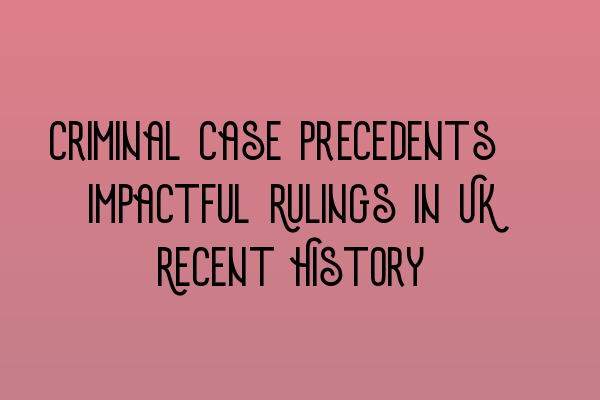Criminal Case Precedents: Impactful Rulings in UK Recent History
Welcome to SQE Criminal Law & Practice Law UK, where we bring you the latest insights and analysis on criminal law in the United Kingdom. In this blog post, we will delve into some of the most impactful criminal case precedents in recent history.
1. R v. Jogee (2016)
One of the most significant rulings in recent years was the case of R v. Jogee. This landmark decision redefined the law of joint enterprise, stating that the foresight of possible harm alone is not enough to establish guilt. The Supreme Court held that there must be evidence of an intention to assist or encourage the principal offender in order to secure a conviction. This ruling had far-reaching consequences and overturned previous convictions that were based on a misinterpretation of joint enterprise principles. To understand the implications further, explore our SQE 1 Practice Exam Questions.
2. R v. Brown (1993)
In R v. Brown, the House of Lords established that consent does not provide a valid defense in cases involving consensual sadomasochistic acts. This ruling clarified that actions which would otherwise be deemed criminal cannot be justified simply by the presence of mutual consent. The decision created a clear boundary between consensual behavior and criminal acts, ensuring the protection of individuals involved. To further explore criminal law principles, take a look at our SQE 1 Practice Mocks FLK1 FLK2.
3. R v. Woollin (1998)
The case of R v. Woollin established the definitions of indirect intent and foresight in cases of murder. The House of Lords clarified that in order to establish intent for murder, the accused must have foreseen the consequence as a virtual certainty and proceeded regardless. This ruling provided clarity and guidance for prosecuting murder cases and has been widely referenced in subsequent cases. For comprehensive preparation on criminal law, check out our SQE 2 Preparation Courses.
4. R v. Dica (2004)
R v. Dica addressed the issue of recklessness in cases involving the transmission of sexually transmitted infections (STIs). The Court of Appeal held that an individual who knows their HIV-positive status and fails to disclose it to a sexual partner can be found guilty of inflicting grievous bodily harm. This decision reaffirmed the importance of personal responsibility in preventing harm to others. To enhance your knowledge and skills in criminal law practice, consider our SQE 1 Preparation Courses.
These are just a few examples of the impactful criminal case precedents that have shaped the UK legal landscape. To stay updated with the latest developments and upcoming SQE examination dates, visit our site regularly and explore our resources, including the SRA SQE Exam Dates.
At SQE Criminal Law & Practice Law UK, we are committed to providing comprehensive and up-to-date information to help aspiring solicitors excel in their careers. If you have any questions or topics you would like us to cover in future blog posts, please don’t hesitate to reach out to us.
